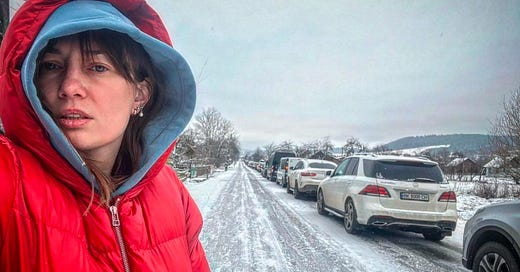In a Sea of Refugees, a Familiar Face, and Why America Must Do All It Can to Aid Ukraine
TFP receives word from Ukrainian writer Kateryna Babkina after fleeing Kyiv, and a conversation with Mark Hetfield, president of the refugee agency HIAS.

By Michael Judge
First, I want to give readers an update on Kateryna Babkina, the wonderful Ukrainian writer I interviewed from her home in Kyiv just a few days before Russian soldiers stormed the border on Feb. 24, launching a senseless invasion that has murdered already hundreds of Ukrainan men, women and children and sparked a refugee crisis not seen in Europe since World War II. I’m happy to report that Babkina, her 14-month-old daughter, Misha, and her mother are now, after a four-day journey spent in long lines at the western border, safe in Poland.
During the journey she posted photos and gave thanks to those who helped her along the way, including a group of tireless girls and women in Kyriv, just 15 kilometers from the Polish border, who for days and nights had been “giving people tea and coffee, hot soup with pasta, and bread with butter and jam.” The younger ones, Babkina explained, clean the dishes; while the older women “cook and distribute” the food. They also collected rubbish and “let people use the WC and hot water in their house”—a blessing for those on a long, cold journey.
Once safe in Poland, Babkina wrote in Ukrainian:
After four days of driving, Misha and I and my mother are safe. Thank you everyone who supported us. Ah, that means I can start helping!
What can I do right now?
1) Create a distribution point. Inquire and bring together people who need help. Medicines for border. Shelter for children. Write.
2) Speak in public, give interviews, write about the situation. Including English. Contact me. . .
I will not write about the shock we are in, because we are the lucky ones. Bombs are not flying at us.
It is this kind of heroism and compassion in the face of brutality that has come to define the Ukrainian people since the invasion began. Like all great leaders, President Volodymyr Zelensky has come to personify the strength and hopes of his people, saying famously to his American counterpart, “The fight is here. I need ammunition, not a ride.” And later, from a bunker in Kyiv, telling reporters that “Ukraine is the heart of Europe, and now I think Europe sees Ukraine is something special for this world. That’s why [the] world can’t lose this something special.”
One would have to be heartless not to recognize the truth in those words. Clearly, Ukraine is now the frontline in an ongoing–and ageless–battle between freedom and tyranny, opportunity and oppression, and yes, good and evil. The truest line in President Biden’s State of the Union Address last night was this: “Putin may circle Kyiv with tanks, but he will never gain the hearts and souls of the Ukrainian people. He will never extinguish their love of freedom.”
What’s less certain is what Biden said next: “He will never weaken the resolve of the free world.” As casualties climb and atrocities mount, let’s hope the resolve of the U.S., its NATO allies, and those many nations who have come to the aid of the Ukrainian people does not fade. For as Garry Kasparov told me in a 2019 interview, excerpted here in TFP, the greatest threat to liberal democracy is not Putin or other thugs and dictators, but “apathy” in the free world.
Keep reading with a 7-day free trial
Subscribe to The First Person with Michael Judge to keep reading this post and get 7 days of free access to the full post archives.


